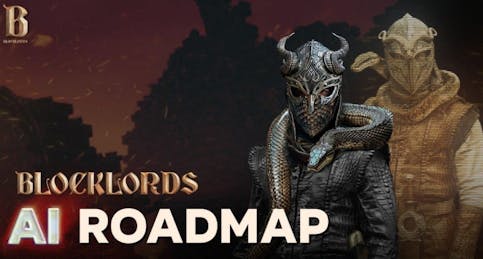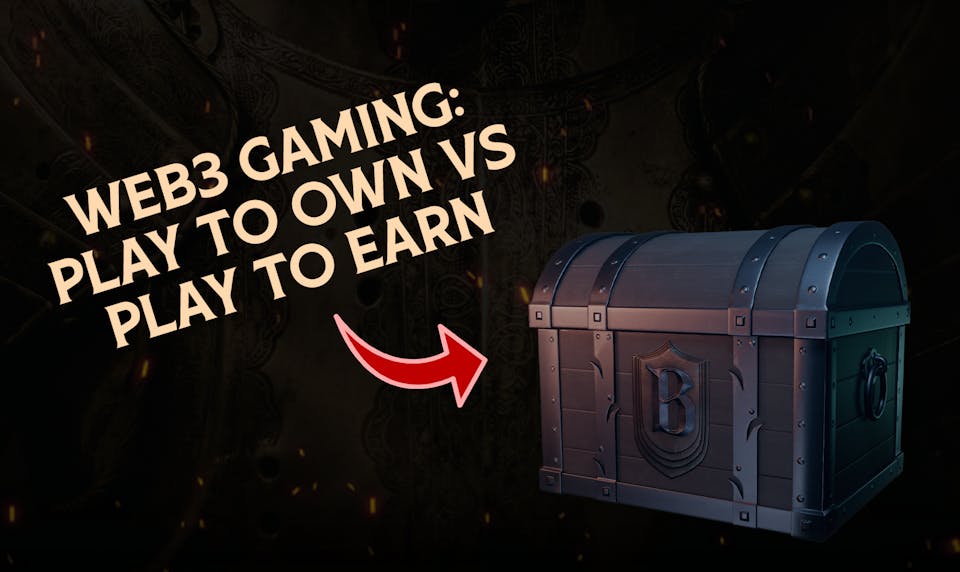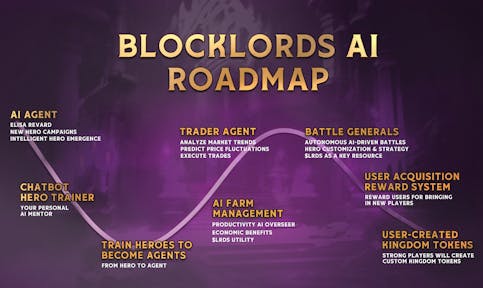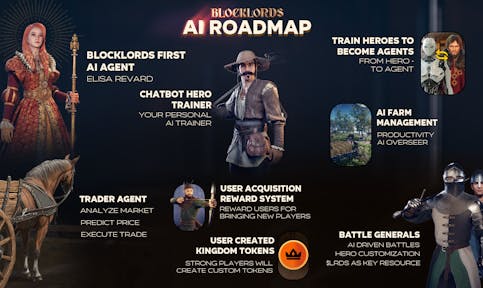14.02.2025
news
4 mins read

14.02.2025
news
4 mins read
BLOCKLORDS ushers in the AI era
How does AI reshape the future of strategy games?
04.06.2023
news

The past couple years has been quite transformative for the gaming industry, as many innovative developments have gone under the radar with the rise of Web3 gaming. The advent of web3 technology has given birth to the era of web3 gaming, and is paving the way for the next generation of online games. Web3 gaming has gained tremendous support, with funding in the space reaching approximately $7B in 2022 alone. Some of the games that have gained prominence in the field include BLOCKLORDS, and studios like CCP have received substantial investments from veteran investors in the gaming and web3 industries.
Historically, games have embraced the Play to Earn model (otherwise called GameFi), which encompasses another key element of web3 - DeFi. Under this model, players are rewarded with coin tokens or other digital assets that they can subsequently sell on the secondary market to line their back pocket. However, there has been a recent shift in the framework of games, with an increasing number of them adopting the Play to Own model.
Where to begin…The origins of the Play to Earn revolution can be traced back to 2014 with the highly experimental Hunter Coin. Although it wasn't exactly a game, the purpose was to push the boundaries of multiplayer interactions on decentralised networks. The project was coined a “human billable currency” - kinda like Effort to Earn - since tokens were earned through real human effort. Players simply played the game and earned coins, which opened the doors for much more experimentation, leading us to the introduction of CryptoKitties, and then the onslaught of other serious P2E games.
Since then we have seen a multitude of smash titles and a variety of genres, from Move to Earn games, such as Stepn, billion dollar games such as Axie Infinity. There are many great opportunities in web3 gaming, and we are here for it!
The Play to Earn model has played a significant role forging a path for web3 games to thrive and has received much media attention. By combining DeFi with gaming, anyone, anywhere can earn money by simply playing a game, which was previously only possible for the best of the best who proved themselves countless times on the world stage. Players worldwide can now participate in these P2E games, earn tokens or other digital assets, and make a living out of it. From an economic perspective, it's a win-win situation, as individuals in poorer countries can improve their quality of life.
However, the model isn't without its flaws. Introducing financial incentives in an accessible manner, as in the P2E model, alters the dynamics of the game, causing players to prioritize farming coins over playing the game for its intended purpose. To overcome this issue, developers must invest adequate time in creating a sound in-game economy and tokenomics that doesnt leave players holding down-only coins for the rest of their time.
The Play to Own model is a web3 gaming framework that shifts the focus of the gaming experience back to what gamers truly care about - having fun! By utilizing smart contracts, in-game assets become more dynamic, with stats and characteristics changing and developing as players progress through the game. This reduces the incentive to quickly sell these assets for a profit. As a result, players develop a sense of connection with the game and its assets, attributing value to the time and effort they put into obtaining them.
With a focus on fun, Play to Own games create an experience that gamers are more familiar with, as games are not bound by the presence of financial incentives. Instead, players can focus on playing the game as intended, creating memories with friends and having a good time.
Introducing dynamic assets not only improves gameplay but also provides players with real ownership of their in-game experiences. Thanks to web3 technology, players now own all the experiences that went into creating these assets, giving true value to their efforts. Players play to own their experiences, which are now out of the control of big tech companies.
This is exactly what we have done with BLOCKLORDS. Each Hero is minted with their own unique stats, and develops as you progress through the game, and defined by your decisions. At the end of the day, every character different and so is every experience.
The key differential between Play to Earn (P2E) and Play to Own (P2O) games is intent. P2E games emphasise financial gain, and while this is great from an economic standpoint, it drastically alters the gaming experience, transforming it from a leisurely and enjoyable activity into an endless grind for profit. For avid gamers, this misalignment with their ideal experience can drive them away from playing games altogether.
On the other hand, the Play to Own framework aligns much better with what gamers genuinely desire - a long-lasting and enjoyable experience. For developers looking to create games that will last for generations, P2O is an excellent option as it rivals the feel of traditional video games. While assets can be sold in a P2O game, it isn't the primary motivation for playing.
The P2O approach is the ideal way to create a gaming experience that prioritises ownership and fun. While financial incentives are essential to some, games are primarily meant for enjoyment, and Play to Own provides gamers with the opportunity to create lasting memories.
The world of gaming is constantly evolving, and the possibilities seem endless with the integration of advanced technology. It's fascinating to witness how the gaming industry has transformed over the years, and with the emergence of Web3 technology, the potential for innovation seems limitless.
As we continue to witness the rise of web3 games, it's highly likely that we will see the emergence of several new Web3 gaming models in the future. These models will offer gamers a more immersive experience and take gaming to new heights.
To truly comprehend the potential of Web3 technology in the gaming industry, it's essential to have a basic understanding of how it works. Web3 technology facilitates decentralised systems, making it possible for players to own their assets and have more control over their gaming experience. This innovation will undoubtedly lead to a more equitable and fair gaming industry, where gamers can be sure of their ownership and control of their in-game assets!
14.02.2025
news
4 mins read

14.02.2025
news
4 mins read
How does AI reshape the future of strategy games?
14.02.2025
news
2 mins read

14.02.2025
news
2 mins read
Blockchaingamer.biz on AI agents in BLOCKLORDS
11.02.2025
news
4 mins read

11.02.2025
news
4 mins read
Age of Intelligent Heroes Begins!